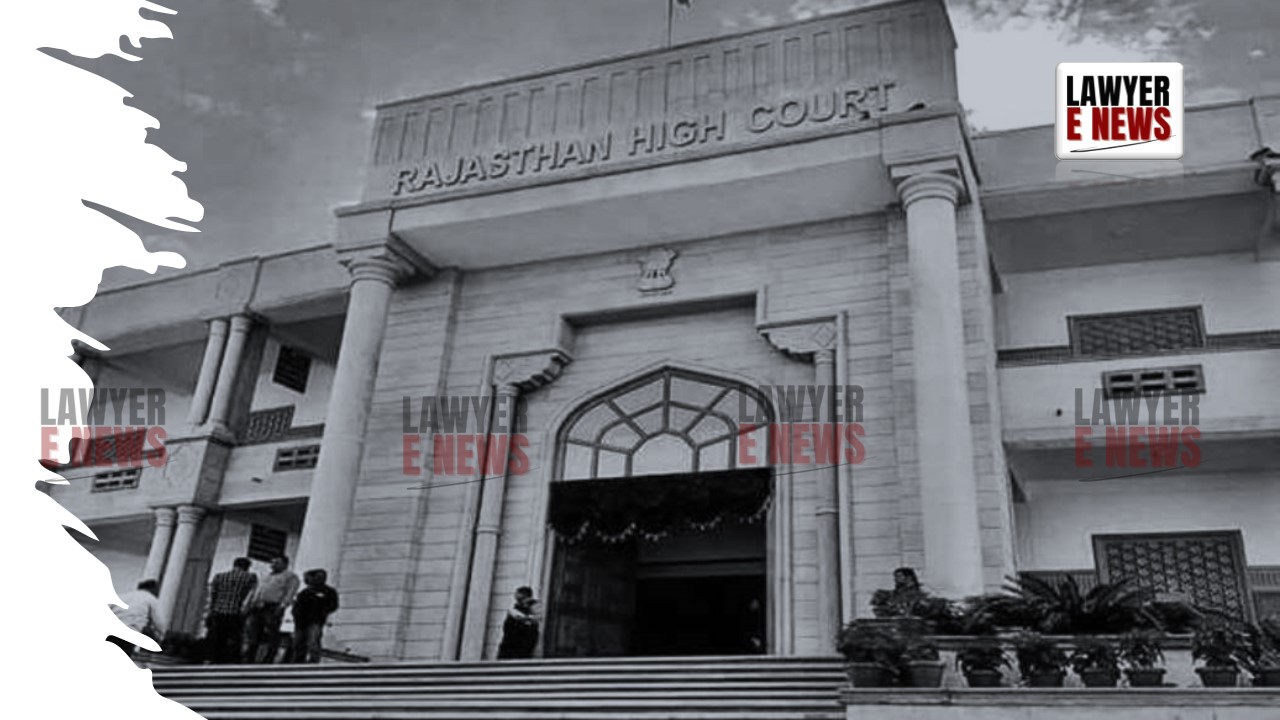-
by Admin
15 February 2026 5:01 PM



In a significant ruling on December 5, 2024, the Rajasthan High Court at Jodhpur overturned the acquittal of Ramdin and Vidyadevi in a dowry death case, convicting them under Sections 304-B, 498-A, and 201 of the Indian Penal Code (IPC). The Division Bench of Hon’ble Dr. Justice Pushpendra Singh Bhati and Hon’ble Mr. Justice Madan Gopal Vyas imposed a seven-year sentence for dowry death under Section 304-B IPC, alongside concurrent punishments under other sections, emphasizing the societal need to deter dowry-related crimes.
The Court observed: "When a crime occurs within the matrimonial home, the burden shifts to the accused under Section 106 of the Indian Evidence Act to explain the circumstances of the death. The accused's failure to provide a plausible explanation, coupled with hurried cremation, raises strong adverse inferences."
The case arose from the death of Kaushalya, who was married to Rajuram, the son of accused Ramdin and Vidyadevi, three years before her death in 2001. The prosecution alleged that Kaushalya was subjected to prolonged cruelty linked to dowry demands. Despite partial fulfillment of dowry demands during the ritual of "Balunda," harassment persisted.
On October 2, 2001, Kaushalya was allegedly burned to death in her matrimonial home, and her body was hurriedly cremated without informing her parents or the authorities. The accused denied the charges and claimed innocence during the trial. However, the Trial Court acquitted them on April 11, 2002, citing insufficient evidence.
The Court highlighted that Section 304-B IPC requires four essential ingredients:
(a) Death caused by burns, bodily injury, or under unnatural circumstances;
(b) Death within seven years of marriage;
(c) Cruelty or harassment soon before death; and
(d) Cruelty linked to dowry demands.
The High Court observed:
• Kaushalya’s death by burning within three years of marriage satisfied the first two conditions.
• Testimonies of her family members (PW-13 to PW-17) and evidence of harassment before and after the Balunda ritual established the link between cruelty and dowry demands.
• The cruelty continued even during her last visit to her maternal home, creating a "proximate and live link" between the harassment and her death.
The High Court emphasized that when a death occurs within the confines of a matrimonial home, the burden shifts to the accused under Section 106 of the Evidence Act to explain the circumstances. It stated:
"The accused cannot remain silent when the prosecution establishes the initial facts of cruelty and unnatural death. The hurried cremation without informing the victim's family further strengthens the inference of guilt."
The Court relied on precedents, including Trimukh Maroti Kirkan v. State of Maharashtra and Uma v. State Represented by Dy. Superintendent of Police, to underscore that unexplained deaths in matrimonial homes warrant adverse inferences against the accused.
The High Court found that the Trial Court had adopted a hyper-technical approach, ignoring critical evidence and credible testimonies. It reiterated:
"Selective appreciation of evidence in cases involving social welfare statutes, such as dowry deaths, defeats the very purpose of such laws."
Citing Satbir Singh v. State of Haryana, the Court observed that the Trial Court failed to appreciate that the victim's harassment and dowry-related demands, though occurring two months before her death, were part of a continuous course of conduct.
The High Court imposed the following sentences:
• Section 304-B IPC: 7 years of simple imprisonment for dowry death.
• Section 498-A IPC: 2 years of simple imprisonment and a fine of ₹2,000 each.
• Section 201 IPC: 2 years of simple imprisonment and a fine of ₹1,000 each.
The sentences were ordered to run concurrently.
The Court emphasized that stringent measures are necessary to deter dowry-related violence, noting:
"Dowry deaths dehumanize women and perpetuate a cycle of misogyny. The law must act as a deterrent to curb this societal menace."
The Court clarified the interpretation of "soon before death" under Section 304-B IPC, stating that it need not refer to a specific time frame but should establish a "proximate and live link" between cruelty and the resulting death.
The Court underscored the applicability of Section 106 Evidence Act, ruling that the accused’s failure to explain circumstances within their exclusive knowledge can strengthen the prosecution’s case.
The hurried cremation of Kaushalya’s body without informing her family or conducting a post-mortem was deemed an attempt to destroy evidence, bolstering the inference of guilt under Section 201 IPC.
Allowing the State’s appeal, the Rajasthan High Court reversed the acquittal and convicted Ramdin and Vidyadevi, observing:
"The Trial Court’s hyper-technical approach failed to account for the continuous harassment faced by the victim, the suspicious conduct of the accused, and their failure to provide an explanation for her unnatural death."
The judgment underscores the judiciary's role in upholding the dignity and safety of women, particularly in cases of dowry-related violence.
Decision Date: December 5, 2024
